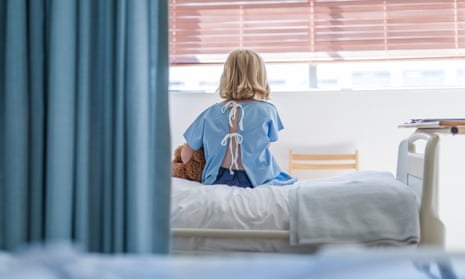Charlotte Ramsden, director of children’s services in Salford and the president of the Association of Directors of Children’s Services:
A number of us are increasingly making deprivation of liberty applications to courts – sometimes for hospitals, sometimes linked to a children’s home or another placement – in order to keep children safe.
It is often done out of desperation, such as when a residential placement breaks down because of the extreme behaviour of the child and the provider gives very short notice – which can be 24 hours – and you have nowhere for them to go. Children can end up in hospital due to mental distress or self-harm and stay there just to keep them safe because there are no immediate alternatives.
These are very traumatised children. We see examples of children being very self-destructive: swallowing glass, swallowing batteries, running into traffic, trying to hang themselves. These children are so distressed, and we need better ways of reaching them in a very therapeutic, supportive, but contained environment. We know a hospital is not necessarily the right place for them, but there is a real gap in specialist provision between a “tier 4” psychiatric bed or welfare secure placement, which are both in short supply, and existing residential or foster care provision, where these children can receive bespoke, wraparound support.
Currently, these specialist placements are very hard to come by and very expensive. You can end up doing 200 national placement searches and find nowhere suitable that is willing to care for some of these children. What we end up doing is creating crisis solutions.
We are always working on options to meet the needs of these children better, and the consequences of nothing changing are stark: an increased risk that children seriously harm themselves or worse, or them harming other people and ending up in the criminal justice system.
Senior paediatric consultant in Manchester who wished to remain anonymous:
Over the last five years there has been a gradual increase in the number of children admitted on to our acute paediatric unit who don’t need the kind of medical treatment we offer. Consistently this summer, 20% of our beds have been occupied by children who need either a specialist mental health bed or a specialist residential placement in the community.
Not long ago we had a looked-after child of primary school age with serious behavioural issues who ended up stuck on our ward for several weeks because the local council couldn’t find them an appropriate placement in Greater Manchester. It was heartbreaking because they ended up 100 miles away, far from anyone they knew.
Many of these patients are not getting the care they need because neither I, my colleagues or the nursing staff are trained to provide the level of psychiatric care they require. We are trained to deal with medical problems. The mental healthcare teams don’t have the capacity to provide the level of daily input that these children need.
Some of the children, the ones with eating disorders, do need medical care because of problems resulting from their condition. But for many we are just keeping them safe, often with the help of agency nurses who offer one-to-one supervision. They can be very difficult to manage, and we do sometimes have to restrain them, physically or with medication.
We’ve had children who have been brought in after almost killing themselves. It was correctly deemed that they weren’t safe to be looked after in the community because there was a high ongoing risk of self-harm, but they were admitted to us, an acute paediatric ward, because there wasn’t a mental health bed for them. Sometimes we’ve had them stay for months waiting for an appropriate bed on an inpatient mental health unit.
These problems have certainly been exacerbated by the pandemic, but it’s a problem that’s been several years in the making due to cuts in psychiatric services. There’s also the knock-on effect for the other children we look after. We are already really busy in paediatrics. It’s like midwinter with the types and numbers of respiratory illnesses we are seeing.
